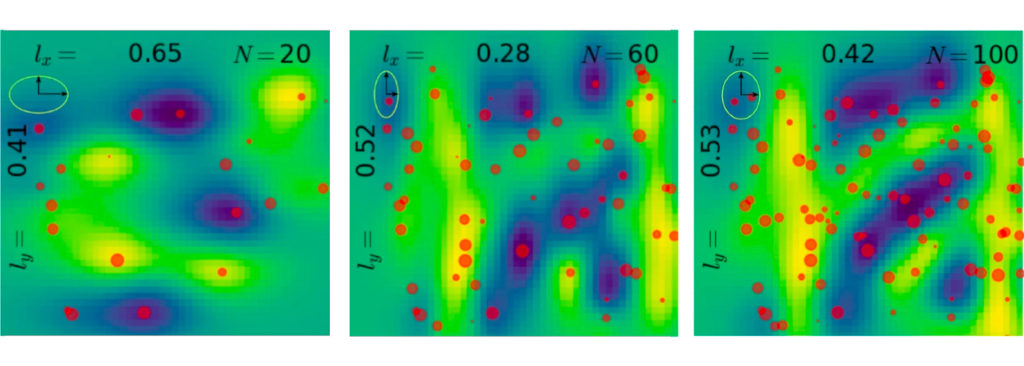
The National Science Foundation’s Research Traineeship Program aims to support graduate students, educate the STEM leaders of tomorrow and strengthen the national research infrastructure. The program’s latest series of grants are going toward university programs focused on artificial intelligence and quantum information science and engineering – two areas of high priority in academia, industry and government.
Chinedum Osuji, Eduardo D. Glandt Presidential Professor and Chair of the Department of Chemical and Biomolecular Engineering (CBE), has received one of these grants to apply data science and machine learning to the field of soft materials. The grant will provide five years of support and a total of $3 million for a new Penn project on Data Driven Soft Materials Research.
Osuji will work with co-PIs Russell Composto, Professor and Howell Family Faculty Fellow in Materials Science and Engineering, Zahra Fakhraai, Associate Professor of Chemistry in Penn’s School of Arts & Sciences (SAS) with a secondary appointment in CBE, Paris Perdikaris, Assistant Professor in Mechanical Engineering and Applied Mechanics, and Andrea Liu, Hepburn Professor of Physics and Astronomy in SAS, all of whom will help run the program and provide the connections between the multiple fields of study where its students will train.
These and other affiliated faculty members will work closely with co-PI Kristin Field, who will serve as Program Coordinator and Director of Education.
Soft materials, or materials that easily change shape at room temperature, include substances like foams and gels, as well as a wide range of polymers such as polyethylene, which is widely used in consumer packaging. They also include synthetic biomaterials that are designed to interface with human tissues, and naturally occurring biological materials such as collagen or bacterial biofilms. With such a variety of forms, the applications for soft materials continue to grow, particularly in medical, environmental and energy-related fields, and traditional research and developments methods are struggling to keep up with demand.
The use of “big data” — data science, machine learning and associated approaches — is seen as a way to overcome the bottlenecks associated with the development of new soft materials. However, while data-driven methodologies have gained considerable traction in accelerating research on hard materials, like metal alloys and inorganic catalysts, the unique characteristics of soft materials, such as their metastability, disordered structure and extreme sensitivity to processing, have stymied similar progress.
This is particularly pernicious given the need for soft materials to address pressing societal concerns, many of which are environment and energy related. Coupled with this, the technology implementation landscape for such materials is also complex and challenging to navigate for classically trained scientists working beyond the lab to provide technology solutions for society.
Penn’s new program will address these challenges by providing specialized training for 50 Ph.D. students and 40 master’s students, enabling them to advance soft materials research using data-intensive methods, and to use science policy to better understand the intersection of new soft-material technology with real-world problems.
A central focus is the development and use of Autonomous Experimentation (AE). Because soft materials often contain multiple components, each with their own physical and chemical properties, finding the ideal mix of those properties, or sequence of processing steps, is important when tailoring a new material to perform a specific function. However, iterating experiments across the vast range of potential compositions and processing parameters is prohibitively costly.
Autonomous experimentation goes beyond enabling high-throughput “blind” testing of physical samples. Instead, it leverages real-time, computer-directed analysis of experimental data to guide and suggest parameters for new experiments. The result is a more intelligent selection of studies that rapidly provide the required knowledge to develop new materials faster.
“AE uses AI to drive materials discovery in experiments that are entirely computer controlled,” Osuji says, “and allows us to rapidly learn what sorts of compositions or particular series of processing steps are most likely to yield a desired outcome.”
Training the next generation of engineers in autonomous experimentation could lead to new data-intensive methodologies and new concepts at the interface of information theory, control theory and materials science. Students will take courses in machine learning and data science, and a new specialized course on autonomous experimentation in soft materials. This course will be co-taught by Kevin Yager of Brookhaven National Laboratory, who is an expert at the forefront of the development and application of novel algorithms and instrumentation for autonomous experimentation on soft materials.
Additionally, as new materials are developed and manufactured at a more rapid pace, better knowledge of science policy and the societal implications of their applications will be required before they can reach the market and provide solutions. Students will take science policy courses to learn how to move research into society as part of this interdisciplinary program.
Beyond the integrated curriculum on data science, AE and science policy, trainees will also engage a broad cross-section of scholars at and beyond Penn in the social sciences, business and design to tackle societal grand challenges. The traineeship takes advantage of Penn’s strengths in soft materials and data science, anchored by the expertise of the Kleinman Center for Energy Policy. The curriculum and programmatic activities of the traineeship program will be made available to the entire Penn community.
Read more about the new Research Traineeship grant in the NSF’s announcement.
